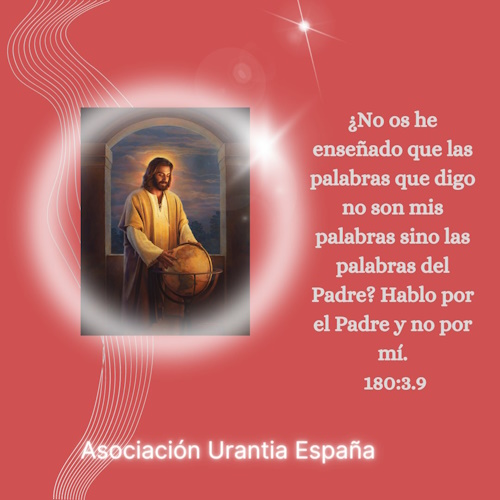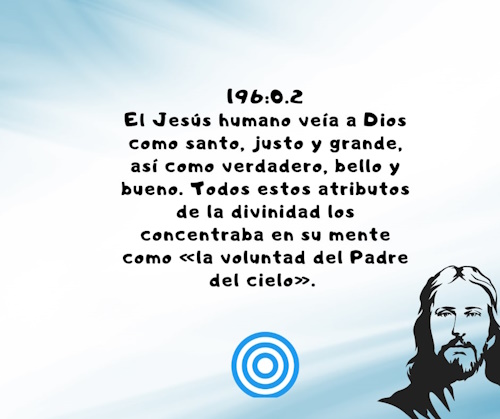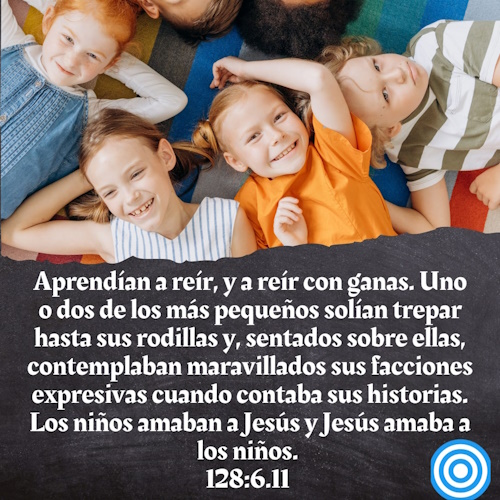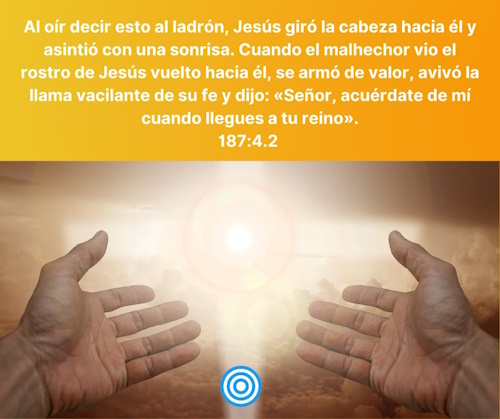© 2023 María Joseph Sánchez Santamaría
© 2023 Urantia Association of Spain
| Luz y Vida — January 2023 — Newsletter | Luz y Vida — January 2023 — Index | Urantia Questionnaire: Marisé Cantero |
¶ The Image of God

Joseph enters the house, tired from a day’s work in Sepphoris. His greeting, as always, is laconic. He is not a man of many words. María responds as usual: a word of welcome, a question about her day, and when he has approached the stone table, then a gesture that, in that atmosphere of laughter and childish chatter, establishes a current of complicity between them. : a hand that rests on the shoulder, an affectionate pat on the head, a rag with cold water to cool off and clean the dust from the road accumulated on that still young face, but which is beginning to show the first furrows.
The truth is that, even if they wanted to talk more, they would have a difficult time with Jesus in the middle. This boy speaks volumes. Ask and answer frequently. He tells everything that has happened to him: that today he was with the shepherds looking for the sheep that was lost yesterday and that fell into a well with a broken leg; that this year’s harvest is going to be very good because Zacarías’ grandson told him so… “This kid talks to everyone, when do you help your mother?”, Joseph murmurs, wanting to seem angry but, deep down , smiling at his joy and self-confidence.
Joseph blesses the table and dinner begins, everyone enjoying the bread and lentils. A small family that, like so many others, enjoys the joys and laughter of the boys and girls who eat from the same pot. Jesu s’ chatter stops, he rests his head on the table and falls asleep. María is leading her siblings to the nearby mat and Joseph stares at that fascinating son. He intuits it different, special. He recalls so many moments in which he has been surprised and admired by his way of seeing God. Like that time when they talk about what happened to the neighbor Tamar, sick with leprosy, and they threw her out of town with stones. After a few moments walking together up the hill Jesus asks:
“Is she a leper because God is angry with her?”
Joseph does not know what to answer, but Jesus, as always, answers his own questions:
“No, God can’t be that cruel.”
Joseph looks at him surprised and then says to the child:
“Yes, God is good.”
Jesus smiles, confirming their intuitions, and they continue walking in silence. After eating together, he returns to the fray with another question:
“Dad, how good is God?”
“-What do you mean?”
“Is he good like the rabbi?” the boy asks.
“He’s better than the synagogue rabbi,” Joseph answers without hesitation, recalling certain events that he prefers not to air.
“Is he as good as a shepherd when he takes care of the cattle?”
“No, Jesus; I think God is better than a shepherd–Jose smiles.
“Is God good like a father?” Jesus asks.
Joseph does not hesitate for a moment, for he knows that he himself is a sinner and often feels so unworthy that God cannot be like him.
“No, Jesus, God is better than a father.”
The boy is silent and then laughs.
Joseph looks at him and wonders what will come next…
“Dad, God can’t be any nicer than you.”
He says it without joking, with the seriousness that sometimes appears in his deep, smiling eyes and in them he sees admiration, gratitude, trust, love… Joseph feels a lump in his throat and his eyes fill with tears. He turns quickly, because he doesn’t want his son to see him like this.
And now, at night, while his son sleeps, he remembers that scene. He feels the surprise again, the shudder to realize that when this child talks to him about God, everything seems different and even he feels better. Then exhaustion overcomes him and he sobs silently for everything he doesn’t understand, for everything that has fallen by the wayside and for everything he intuits. Once the children are in bed, María approaches him, sits next to him, caresses his wet cheeks and, silently, hugs her husband and also looks at her sleepy eldest son.
How difficult it is to talk about God! Anyone who wants to do this needs to know that they are probably going a little off the rails, and God probably smiles at our attempts to understand and describe it.
Suppose I told you, the reader of this newsletter, to stop for a moment and try to explain to someone who knows nothing about God “who is God?”, “what is he like?” What would you say? What words would you use? Would you say he is a father, a mother, a friend? Would you use conventional terms or new words? Would you tell it that it is love or that it is the designer of the vast multi-universe hologram that is reality?
In other times we learned to say that he was the King of Kings or the Lord of Hosts. Now what could we say? Call him, instead, the Lord of Solidarity, the president of the planet, or the quantum field underlying all of reality?
How important is the image we have of God, an image that shows our deepening understanding of Him. Year by year, century by century, we get to know him better. But if we can be clear about something, it is that whatever God really is, it is broader than our categories to explain it.
And depending on how we believe what God is, we will live the faith in one way or another. It is not the same to understand a God who waits with open arms for the just and the unjust, or to imagine him with a huge hammer, ready to strike down the personnel who go out of the script. It is not the same to speak of a God of Love as of a God of Law, of a Being that has originated us and thought in a personal way to believe that it is an impersonal and abstract Being that is governed by mechanical laws.

The readers of The Urantia Book have the great fortune of being able to read dozens of documents that describe what God is like and how Jesus of Nazareth manifested it. For example, we know that Jesus did not renounce his roots, but rather expanded and improved the image that his contemporaries had of Divinity:
The human Jesus saw God as being holy, just, and great, as well as being true, beautiful, and good. All these attributes of divinity he focused in his mind as the “will of the Father in heaven.” Jesus’ God was at one and the same time “The Holy One of Israel” and “The living and loving Father in heaven.” The concept of God as a Father was not original with Jesus, but he exalted and elevated the idea into a sublime experience by achieving a new revelation of God and by proclaiming that every mortal creature is a child of this Father of love, a son of God. (UB 196:0.2)
What’s more, Jesus felt totally united to Divinity, to the Father or Source of Everything. He said it repeatedly:
And when Philip had spoken, Jesus said: “Philip, have I been so long with you and yet you do not even now know me? Again do I declare: He who has seen me has seen the Father. How can you then say, Show us the Father? Do you not believe that I am in the Father and the Father in me? Have I not taught you that the words which I speak are not my words but the words of the Father? I speak for the Father and not of myself. I am in this world to do the Father’s will, and that I have done. My Father abides in me and works through me.” (UB 180:3.9)
Jesus, therefore, gives us a new image of God. In Jesus the fullest image of God was manifested, the authentic human being was shown. In his way of speaking about God and in his way of being human we discover the human face of God. God and Man united.

We are surprised and pleased to know that Jesus, that God, was not only deep in his reflections and serious, but also loving and smiling. Playful with the little ones and analytical with the adults.
The children were always welcome at the repair shop. Jesus provided sand, blocks, and stones by the side of the shop, and bevies of youngsters flocked there to amuse themselves. When they tired of their play, the more intrepid ones would peek into the shop, and if its keeper were not busy, they would make bold to go in and say, “Uncle Joshua, come out and tell us a big story.” Then they would lead him out by tugging at his hands until he was seated on the favorite rock by the corner of the shop, with the children on the ground in a semicircle before him. And how the little folks did enjoy their Uncle Joshua. They were learning to laugh, and to laugh heartily. It was customary for one or two of the smallest of the children to climb upon his knees and sit there, looking up in wonderment at his expressive features as he told his stories. The children loved Jesus, and Jesus loved the children. (UB 128:6.11)
It was difficult for his friends to understand the variety and breadth of his intellectual activities, his ability to move fully and without transition from deep political, philosophical or religious debates to the carefree and joyful games of children of five to ten years.
What a wonderful being is this God that we glimpse in Jesus of Nazareth!! A being so balanced that he knew how to die as magnificently as he lived, whole and with a smile.

We need so much in these times that our image of God is not just a theoretical notion, a concept, but a real way of feeling and living God, of acting and loving, just like Jesus felt.
What is God to you? Someone who helps us or who scares us? Someone who answers or who is silent? Is it far or is it close? What god do you pray to? Who do you turn to in your quiet hours? Is it a personal relationship with him? How has the image you have of Him changed in your life? Do you still believe the same way you did when you were little?
In being able to respond to these questions, we play a lot about how we are going to live and whether God is just a distant reference, one more idea among many others, or someone truly important when it comes to acting, dreaming, and choosing.
Centuries ago, a restless and searching man finally discovered the image of God that fell in love with him and changed his life. His heart was looking for peace, but it took time to find it. He tirelessly sought to quench his thirst for transcendence in philosophy, in esoteric doctrines and in excesses, without success. He lived carnal love, paternal love, the love of his friends and social recognition, but nothing filled him.
He finally discovered where Peace was, within himself:
I loved you late, beauty so old and so new,
late I loved you! and you were inside me and I was outside,
and so on the outside I was looking for you; and, misshapen as it was,
I was throwing myself at these things that you created.
You were with me, but I was not with you.
They kept me away from you those things that,
if they were not in you, they would not exist.
You called me and cried out, and you broke my deafness;
you shone and shone, and healed my blindness;
you exhaled your perfume, and I inhaled it, and now I long for you;
I liked you, and now I feel hungry and thirsty for you;
you touched me, and I long for the peace that comes from you.(Augustine of Hippo, The Confessions)
This is a beautiful challenge, really listening to who is inside, for this beginning of the year.
¶ References
| Luz y Vida — January 2023 — Newsletter | Luz y Vida — January 2023 — Index | Urantia Questionnaire: Marisé Cantero |